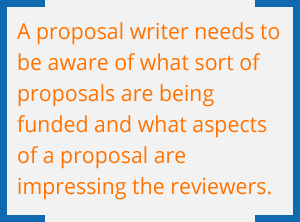Research Grant Proposal: A Sales Document Not a Technical Document

The competition for grant funding is fierce and authors need every advantage to gain the approval of the holders of the moneybags. One of the best pieces of advice I have ever heard came from a director of research who was a very successful writer of proposals.
“A lot of people think a grant proposal is a technical document,” he said. “It’s not. It’s a sales document.”
To write a successful proposal, you need to do more than just presenting a technically sound idea. You must also show how funding this idea will benefit the grantor. What does the grantor get in return? How will a successful research outcome solve whatever problem the grantor has?
In many research proposals, the sales aspect involves relating the research to a practical goal—converting fundamental research into applied research. Developing a new method of selectively fluoridating compounds may be of theoretical and mechanistic interest to a researcher but a funding agency might not appreciate these goals. But inventing a new way to make selectively fluoridated pharmaceuticals may be of great interest to them, particularly if these new drugs are likely anti-cancer agents.
 Funding agencies get a lot of proposals that attempt to tie in to current hot topics of interest, cancer research being one of the favorites. Sometimes these efforts seem strained.
Funding agencies get a lot of proposals that attempt to tie in to current hot topics of interest, cancer research being one of the favorites. Sometimes these efforts seem strained.
“Some pretty esoteric proposals out there,” one reviewer commented to me with a smile.
The Green movement, especially clean alternative energy sources, is another popular bandwagon that many researchers are trying to climb onto. But even if a funding agency gives out money for fundamental research they are going to want to see some justification for why this topic is important.
Einstein would have had a hard time getting a grant to develop his theory of general relativity as an abstract concept. But if he pointed out how it could solve certain real problems in astronomy such as the unexplained precession of the planet Mercury, he would have gotten a careful hearing.
Certain topics tend to be appreciated by reviewers, for better or for worse, and a proposal writer needs to be aware of what sort of proposals are being funded and what aspects of a proposal are impressing the reviewers. I once wrote a funding proposal to synthesize a class of compounds useful as high energy fuels. My proposal was largely devoted to synthesis of actual compounds, with structures drawn out and pathways shown. I was beaten out by a proposal that was heavily based on computer modeling of prospective compounds—no lab synthesis, just number crunching to find some good targets. I had already done this, so I thought. I had also included estimates of fuel energy, density, etc. in my proposal but this was done mostly by semi-empirical methods, which I considered more reliable than computer programs which I knew to be very spotty in their predictions. But computers were considered cutting edge technology and this aspect of the rival proposal was a key factor in its acceptance. No use to protest after the fact that the reviewers were enraptured by a flashy but less reliable technique.
What I should have done was recognize in advance the appeal of computers, taken on a collaborator with expertise in modeling, and written a proposal featuring computer modeling as well as synthesis of promising candidates. In this case, my proposal might have been seen as combining the best of both worlds and been awarded the grant.





